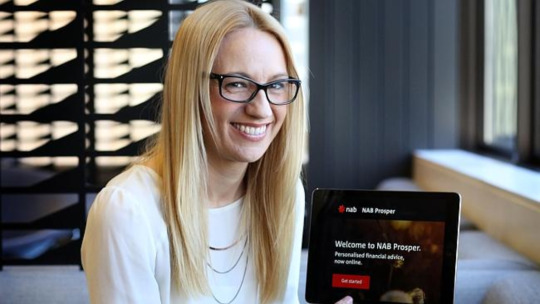The National Bank of Australia is the first Australian bank to offer computerised financial advice. This service, NAB Prosper, will be released early next month. Its premise is simple: assess customers’ financial ambitions and offer a plan to achieve them by considering their current position.
How will it change the game? Moving away from tradition financial advice, Prosper will of course provide the advice through a digital platform.

Anne Bennett, General Manager of NAB’s Digital and Direct Services, presents NAB Prosper.
How it works?
If you are a NAB customer, you can create a NAB Prosper account to access the service. An online survey then takes you through a series of questions such as your income and retirement goals, and then produces advice based on your responses.
Anne Bennett, General Manager of NAB’s Digital and Direct Services, says the aim of the service is to prompt the large majority of customers who do not actively seek financial advice to get in touch with a financial adviser. Although it is advertised as a personalised service, the online advice is legally and practically speaking ‘general’ advice.
Robo-advice is so mainstream
Although Bennett attempts to differentiate NAB’s service, it is part of a broader trend to computerise financial services. Since 2008, startups have been developing software that creates a client profile to build a corresponding portfolio. The software also rebalances portfolios if investments diverge too far from the original plan. The general term used for this kind of financial advice is called robo-advice.
Fund managers and banks are also incorporating robo-advice. Last month, the world’s biggest fund manager, BlackRock acquired a robo-adviser called FutureAdvisor. Other fund managers offer robo-advice like Fidelity, the Vanguard Group and Charles Schwab Corporation.
Cheap and convenient
The popularity of robo-advice makes a lot of sense. It is cheaper since it bypasses human interaction.
For example, FutureAdvisor offers robo-advice for retirement at a 5% fee. Robo-advice is also very appealing because it is convenient. ‘Convenience wins above almost all else’ says FutureAdvior’s found Bo Lu.
A mix of old and new
However, robo-advisers’ benefits do not render face-to-face financial advice superfluous. Some critics had anticipated people would want a face-to-face consultation when investing their hard earned retirement fund. However, Bennett argues that ‘there will always be a place for advisers and face-to-face conversations’. Rather than replacing traditional advice, robo-advice is a cost effective and easy step towards it. David Murray, former Commonwealth Bank chief says ‘new models for delivering advice more cost effectively [should] sit alongside existing comprehensive face-to-face advice models’.
The new age of online services
Robo-advice remains at its early stages. Naturally, it may be a risky tool for investors because it has not been tested across varying market conditions. Regulation is also being considered to address the quality of the advice. However, despite these concerns, consulting company, A.T. Kearney has recently conducted a study concluding that computerised advice in the US will become mainstream within the next 3 to 5 years. A.T. Kearney will publish a report later this month to assess Australian consumers’ appetite.
Easier and more convenient access to financial advice through technology is a model that may be replicated in other sectors. For example, LawPath is a platform that provides online legal solutions. It does not ignore the importance of face-to-face dialog but acknowledges that legal services can be expensive and hard to access. lawpath.com.au gives you convenient and affordable legal documents that you may also choose to get reviewed by a lawyer from our network of 600+ lawyers for a fixed fee.







